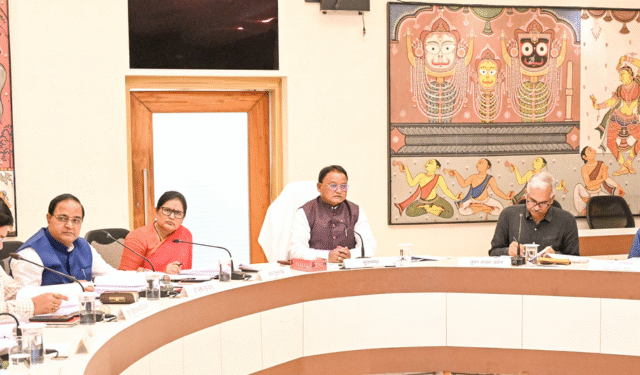The 27th Cabinet Meeting of the Odisha Government was held today at Lok Seva Bhavan under the chairmanship of Chief Minister Mohan Charan Majhi.
Following the meeting, the Chief Minister briefed the media on the decisions taken.
The Cabinet approved a total of four proposals from three departments after detailed deliberation. These include:
- Works Department:
Odisha Government Sanctions Rs 226 Crore for Maa Tarini Temple Development in Ghatagaon
The Odisha Government has approved a major infrastructure development plan for the revered Maa Tarini Temple in Ghatagaon, Keonjhar district. Responding to long-standing demands from devotees, the Cabinet has sanctioned a Rs 226 crore project aimed at enhancing the temple precinct and surrounding facilities.
The lowest tender, valued at Rs 146 crore (excluding GST), has been awarded to M/s Dillip Construction Pvt. Ltd. The development will span 59.206 acres and is scheduled for completion within 24 months.
The initiative is expected to boost local economic growth and elevate Ghatagaon’s status as a prominent religious tourism destination in India.
Key Facilities to Be Developed:
- 🛏️ 216-bed Pilgrim Guest House
- 🛕 Dedicated Pilgrimage Center
- 🧭 Interpretation Center
- 🍽️ Food Plaza and Watch Tower
- 🛍️ Market Complex
- 🍛 Nadia (Coconut) Bhandaar and Prasad Dining Hall (seating capacity: 500)
- 🎒 Cloak Room for Storage
Once completed, the Maa Tarini Temple complex will offer modern amenities while preserving its spiritual essence, positioning Ghatagaon as a model for faith-based tourism and regional development.
- School and Mass Education Department:
Odisha Government Approves Godavarish Adarsha Vidyalaya Scheme to Transform Rural Education
The state government has approved the Godavarish Adarsha Vidyalaya (GAV) Scheme, aimed at establishing model schools at the Gram Panchayat level.
The initiative aligns with the objectives of the Right to Education (RTE) Act, 2009, and emphasizes equitable access, foundational literacy and numeracy (FLN), and holistic development of students. It also complements the vision of the National Education Policy (NEP) 2020 and the NIPUN Odisha Mission.
Under the first phase of the scheme, the government plans to construct 2,200 model schools between 2025–26 and 2027–28, with an estimated budget of Rs 12,000 crore. Each school is projected to cost approximately Rs 5 crore, with final expenditures determined through detailed project reports (DPRs).
The GAV schools will be built on strong educational foundations, incorporating innovative teaching practices and active community participation. The goal is to create a robust educational ecosystem that empowers every child with equal learning opportunities and foundational skills.
- State Labour and Employees State Insurance Department: (2 Proposals)
Reforms to Shops and Commercial Establishments Act aim to attract investment, enhance productivity, and empower workers:
In order to improve the Ease of Doing Business in the State and to create more economic activities, the Cabinet has approved the following amendment proposals in the Odisha Shops and Commercial Establishments Act, 1956:
1. Provisions of the Odisha Shops and Commercial Establishments Act, 1956 shall be applicable to such Shops and Commercial Establishments in the State which engage 20 or more employees.
2. increase in daily working hours from 9 hours to 10 hours.
3. The work shift of an employee in an establishment shall not exceed six continuous hours without an interval for rest of at least half an hour.
4. Increase in overtime work limit from 50 hours to 144 hours during a period of three months.
5. Where an employee works in any establishment for more than 10 hours on any day or for more than 48 hours in any week, he shall, in respect of such overtime work be entitled to double the ordinary rate of wages.
6. Establishments shall have the choice to remain open 24*7 in a day and 365-days in a year.
7. Removal of prohibition on engagement of women employees during night. Women employees can be engaged during night with their written consent and subject to conditions of safety, security and dignity of women as may be notified by the State Government.
These reforms shall reduce compliance burden on small businesses and provide impetus to entrepreneurs, thus creating more economic activities while ensuring welfare of employees. It shall also enhance employees’ earnings by allowing more overtime work and promote higher work participation opportunities for women in
organized sector and corporate sector.





























